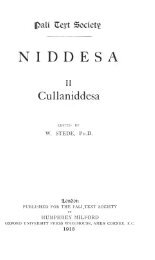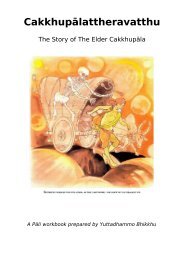Lessons In Practical Buddhism - Sirimangalo.Org
Lessons In Practical Buddhism - Sirimangalo.Org
Lessons In Practical Buddhism - Sirimangalo.Org
You also want an ePaper? Increase the reach of your titles
YUMPU automatically turns print PDFs into web optimized ePapers that Google loves.
to create, wanting to become. When we see how dangerous<br />
the mind can be if we let it chase after its desires, it can<br />
actually be quite shocking.<br />
If one has never practiced insight meditation, most people<br />
think that the mind is a great thing. We think, “I like this, I<br />
like that, I want this, I want that, but I can control it.” Once<br />
we meditate, we realize no, you can’t, not even a bit. When<br />
lust comes up, when the desire for something comes up,<br />
there is no hope of denying it. It is a very dangerous thing.<br />
The mind will drag you, kicking and screaming, to the candy<br />
store to get what it wants, and if you want to get it out, you<br />
have to drag it, kicking and screaming, out of the candy<br />
store. You don’t want to go, and it doesn’t want to leave,<br />
and you fight. We have to fight with our mind. If we’re not<br />
careful, it will overwhelm us for sure, time and again. If you<br />
look at bad monks, even monks who at one time had good<br />
intentions and wound up on the wrong path, monks who<br />
abuse children or drink alcohol, for example, you can see<br />
how dangerous the mind can be. Alcoholics, drug addicts,<br />
even addicts to sensuality can get into very difficult states<br />
because of their own minds. So this is ādīnavasaññā,<br />
number four.<br />
pahānasaññā<br />
Number five is pahānasaññā. This is starting on the path.<br />
Actually, this is a positive perception, since it says that we<br />
can actually give free ourselves from suffering. The Buddha<br />
said we should never lose sight of the fact that it’s possible,<br />
that the path exists. If it didn’t exist, he wouldn’t have<br />
taught it. He said, “If it didn’t exist, I wouldn’t tell you follow<br />
the path. If you couldn’t abandon these things, I wouldn’t<br />
tell you to abandon them.” He could have said, as everyone<br />
else says, “Ah, live with it.” So we see that the Buddha<br />
wasn’t pessimistic. He was, if anything, optimistic, because<br />
ordinary people say, “Ah, life is suffering, so, live with it!<br />
Make the best of it.” That’s really pessimistic, or some might<br />
say, “realistic”, because they think there is no hope for<br />
something better. Some people might think that the Buddha<br />
was not realistic, but certainly he was not pessimistic. He<br />
said, “No, don’t settle for this. Don’t settle for such a<br />
89












